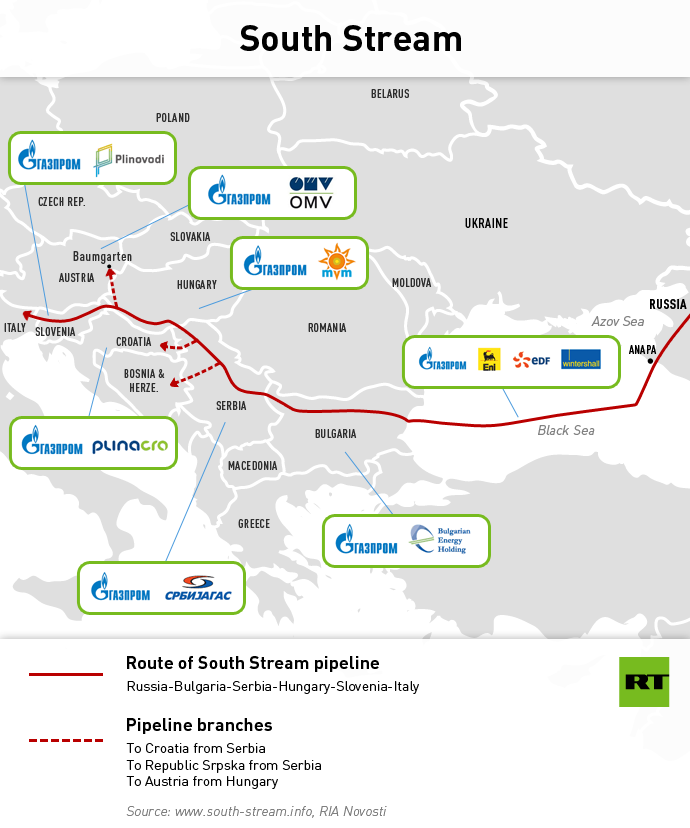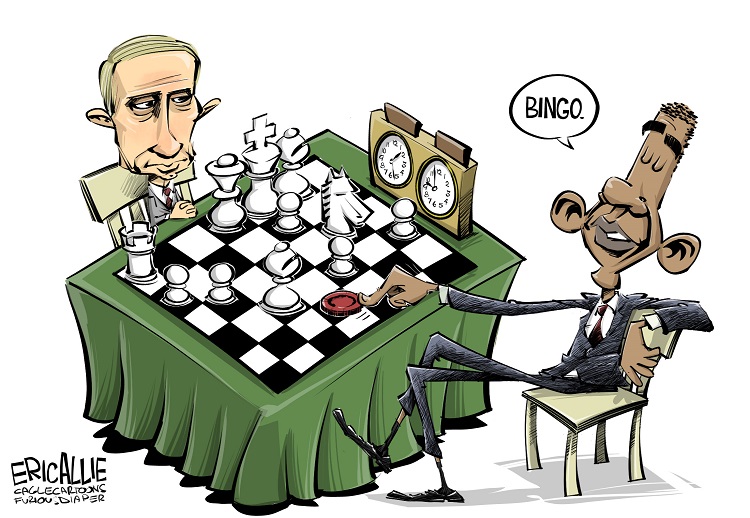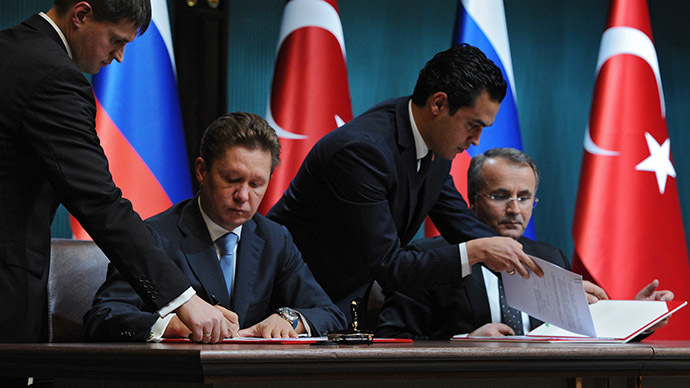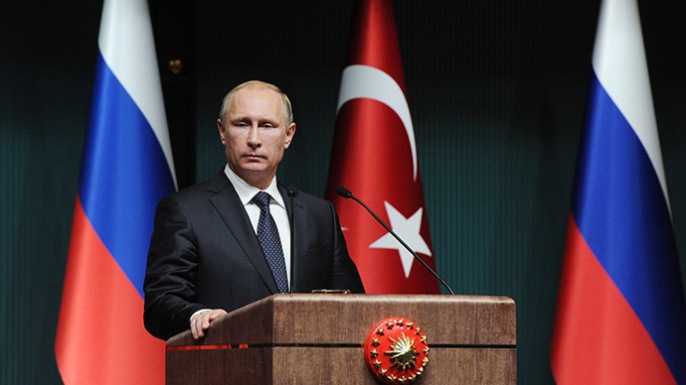The Master of Chess and Diplomacy, Vladimir Putin, in A Move Puts Checkmated the EU, Bulgaria and Turkey: “Putin Kills South Stream Pipeline, Will Build New Massive Pipeline To Turkey Instead”
Putin, thanks to the sanctions against Russia (unfortunate and uncoordinated maneuvers to try to weaken the Asian Bear), uses the weakness of relations between the US and its allies, put a neck loop to Erdogan’s Turkey, excludes from the game the unreliable and corrupted Bulgaria, puts in line the European puppets, strengthens the role of unquestionable Russian leadership on the international chessboard.
Putin, in few cheeky and daring moves, beats the competition of the regimes of the Gulf (offering an immediate opportunity of oil industry for the Turks vultures), turning them away from the ambitions on Syrian oil fields and from an impossible pipeline from the south’s regimes (Saudi-Qatar), trapped in the Daesh’s quicksands of Iraq…
Only a true master of chess and judo (judo uses the energy of the opponent to turn it against it) can be able to take advantage from the foolhardy attacks of his opponents, and the Russian government, headed by Putin, is demonstrating a great strategic ability, but also the capacity to unite to pacify, rather than divide by wage war.
The game is fully open and to play, with a scenario that changes unpredictably, day by day: do not underestimate the chessplayer Putin and never take for granted his moves…
Putin Kills “South Stream” Pipeline, Will Build New Massive Pipeline To Turkey Instead

A dozen F-15s and approximately 180 personnel from the 493rd, based at RAF Lakenheath, England, have deployed to Graf Ignatievo Air Base to participate in a two-week bilateral training exercise with the Bulgarian air force, Pentagon spokesmen Col. Steve Warren told reporters Monday.
The exercise began Monday and will continue through Sept. 1.
The purpose of the deployment is to “conduct training and focus on maintain joint readiness while building interoperability,” Warren said.
The move comes at a time when America’s Eastern European partners and allies are concerned about Russian military intervention in Ukraine. There are fears that Moscow might try to destabilize other countries in the region.
“This is a reflection of our steadfast commitment to enhancing regional security,” Warren said about the exercise.
We concluded as follows: “How will Putin react one wonders?”
We now have the answer: earlier today, in a stunning announcement, Putin revealed that the South Stream project is now finished. As
the WSJ reports, “Putin said Moscow will stop pursuing Gazprom’s South Stream pipeline project that would supply natural gas to Europe with an underwater link to Bulgaria, blaming the European Union for scuttling the project.”
“We couldn’t get necessary permissions from Bulgaria, so we cannot continue with the project. We can’t make all the investment just to be stopped at the Bulgarian border,” Mr. Putin said. “Of course, this is the choice of our friends in Europe.”
“We think that the European Commission’s position was not constructive,” Mr. Putin said. “If Europe does not want to implement it, it will not be implemented.”
Putin is right: Europe –
Austria excluded - had seen rising resistance to the South Stream in recent months as the crisis in Ukraine has intensified. The EU is concerned that the project would cement Russia’s position as Europe’s dominant supplier of natural gas. Russia already meets around 30% of Europe’s annual needs.
So what does Putin do? He signs a strategic alliance with NATO member Turkey, the only country in Europe that is anything but European (over the endless veto of Germany preventing its entrance into the EU over fears of cheap, migrant labor) and which lately has been increasingly anti-Western, to build a new mega-pipeline to Turkey instead. As
RT reports, Gazprom CEO Aleksey Miller said the energy giant will build a massive gas pipeline that will travel from Russia, transit through Turkey, and stop at the Greek border – giving Russia access to the Southern European market. In effect, Russia will still have access to the Southern Stream endmarkets
The pipeline will have an annual capacity of 63 billion cubic meters. A total of 14 bcm will be delivered to Turkey, which is Gazprom’s second biggest customer in the region after Germany.
Russia’s energy minister Aleksandr Novak said that the new project will include a specially-constructed hub on the Turkish-Greek border for customers in southern Europe.

In a joint press conference between Putin and Turkish leader Erdogan, the Russian said that the supply of Russian gas to Turkey will be raised by 3 billion cubic meters via the already operating Blue Stream pipeline, Last year, 13.7 bcm of gas was supplied to Turkeyvia Blue Stream, according to Reuters.
And another fringe benefit of becoming a preferred Russian ally: Moscow will reduce the gas price for Turkish customers by 6 percent from January 1, 2015, Putin said. Later, Novak said the discount could reach 15 percent, subject to negotiations. Sorry Ukraine.
And sorry Bulgaria, which despite being wholly reliant on Russian gas for its commercial, industrial and residential needs, has decided to side with the sinking European Union, making it merely the latest insolvent vassal state of the sinking Eurozone, something Putin made abundantly clear during today’s conference:
- PUTIN: BULGARIA UNABLE TO ACT AS SOVEREIGN STATE OVER GAS LINK
- PUTIN: RUSSIA TO REORIENT ENERGY RESOURCES TO OTHER MKTS: IFX
Bulgaria should now expect its gas costs to boldly go where Ukrainian energy prices have so boldly gone before.
As for Turkey, the country that bridges Europe with Asia is merely the latest expansion ofPutin’s anti-dollar alliance:
- TURKEY, RUSSIA AGREE TO USE LOCAL CURRENCIES IN TRADE: TRT
Or, as Obama would put it, Russia just got even more “isolated.”
~
Gazprom to build new 63 bcm Black Sea pipeline to Turkey instead of S. Stream
RT, 2/12/2014 ~ Gazprom CEO Aleksey Miller said the energy giant will build a massive gas pipeline that will travel from Russia, transit through Turkey, and stop at the Greek border – giving Russia access to the Southern European market.
The pipeline will have an annual capacity of 63 billion cubic meters. A total of 14 bcm will be delivered to Turkey, which is Gazprom’s second biggest customer in the region after Germany.
Russia’s energy minister Aleksandr Novak said that the new project will include a specially-constructed hub on the Turkish-Greek border for customers in southern Europe.
While the pipeline will be registered as a Russian company, Miller said that Gazprom will“consider offers from Turkish partners if they express an interest in buying into the project.”
For now, the supply of Russian gas to Turkey will be raised by 3 billion cubic meters via the already operating Blue Stream pipeline, Vladimir Putin said during a joint press conference with his Turkish counterpart, Recep Tayyip Erdogan. Last year, 13.7 bcm of gas was supplied to Turkeyvia Blue Stream, according to Reuters.
From a political point of view, Turkey and Russia are “poles apart,” but from an economic point of view the gas deal between two states have united Moscow and Ankara in a common interest.
“Turkey would in fact like the gas pipelines to go through Turkey, because they can collect rent from it,” Martin McCauley, an economics specialist from the University of London, told RT. “Turkey sees itself, if you like, as a partner – the in-between partner – who will take gas from Iran and Russia to Europe.”
December 1, 2014. Russian President Vladimir Putin at the concluding news conference in Ankara. (RIA Novosti/Michael Klimentyev)
Moscow will also reduce the gas price for Turkish customers by 6 percent from January 1, 2015, Putin said. Later, Novak said the discount could reach 15 percent, subject to negotiations.
Novak later confirmed that Vladimir Putin personally ordered for the South Stream project to be mothballed, and its existing facilities to be repurposed for the new Turkish pipeline.
The much-delayed South Stream was supposed to connect underwater Black Sea pipelines with a network in Eastern Europe, with Bulgaria as the entry point.
The project had run into difficulties, as it violated EU regulations on the same company owning the pipelines and the gas they transported. While several previous governments in Bulgaria, which is wholly dependent on Russian gas lobbied Brussels to make an exception, the current government said it would not give Gazprom a building permit. The cost of the underwater and Eastern European segments of the project was estimated at €23,5 billion, by a senior Gazprom official last month.
The new project will include a specially-constructed hub on the Turkish-Greek border. Russia’s energy minister Aleksandr Novak said it will supply customers in Eastern and Southern Europe.
~
SOURCES:
The views expressed in this article are the sole responsibility of the author and do not necessarily reflect those of the Blog!
 In a joint press conference between Putin and Turkish leader Erdogan, the Russian said that the supply of Russian gas to Turkey will be raised by 3 billion cubic meters via the already operating Blue Stream pipeline, Last year, 13.7 bcm of gas was supplied to Turkeyvia Blue Stream, according to Reuters.
In a joint press conference between Putin and Turkish leader Erdogan, the Russian said that the supply of Russian gas to Turkey will be raised by 3 billion cubic meters via the already operating Blue Stream pipeline, Last year, 13.7 bcm of gas was supplied to Turkeyvia Blue Stream, according to Reuters.
















No comments:
Post a Comment